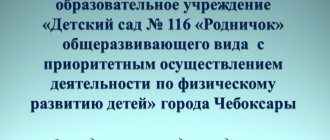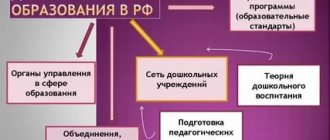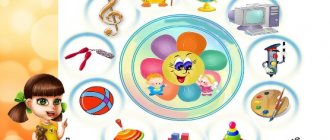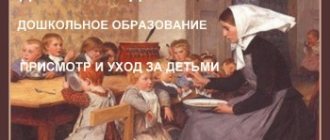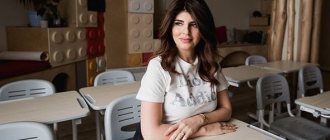New programs for kindergartens
In the last two or three years, several new programs for kindergartens have been announced, developed by reputable scientific psychological and pedagogical teams. These include the programs “Development”, “Rainbow”, “Golden Key”, “Childhood” and “House of Radio”. In order to help teaching staff of preschool institutions in choosing educational programs, we offer a brief description of them based on a preliminary analysis conducted by employees of the laboratory for designing innovative forms of preschool education at the Institute of Pedagogical Innovation. The programs were considered according to the following scheme:
- Theoretical justification of the program,
- The nature of the program's goals,
- age differentiation of program tasks,
- methodological support,
- the need for special training of teachers,
- connection with traditional programs,
- availability of criteria for assessing children's achievements.
The starting point for the comparative analysis was the traditional and most widespread Russian “Education Program in Kindergarten” ed. The program is based on the concept of child development through active activity and learning. The main goals are: caring for the health of children, their comprehensive development and education in accordance with age characteristics and preparation for school. The program will include a schedule of tasks, the content of education and upbringing of children from 7 months to 7 years, as well as a general framework for living arrangements for each age group; structured by aspects of education and types of activities, types of educational activities, cross-section for all ages. Children's achievements are recorded through quantitative growth in knowledge and skills. The program prescribes a large number of mandatory activities for children, determines the content and methodology with the help of extensive methodological recommendations. Although the program gives the teacher fairly strict rules regarding the organization of children's activities as a whole, it does not prioritize developmental goals for different preschool ages, does not orient the teacher to individual differences and take into account children's activities, but presents the child as an average statistical unit.
Additional and sample programs
Additional preschool education programs. Based on clause 6 of Art. 14 of the Law of the Russian Federation “On Education”, an educational institution, in accordance with its statutory goals and objectives, can introduce additional educational programs to the main educational programs and provide additional educational services beyond the main educational programs that determine its status.
The provision of additional educational services (paid, free) and the implementation of additional educational programs is carried out only at the request of parents (their legal representatives) on a contractual basis. The use of additional educational programs in preschool education (hereinafter referred to as additional programs) became possible with the development of new, flexible forms of teaching preschoolers in creative workshops, clubs, sections, etc., organized in preschool institutions and on their basis. In a number of regions of the Russian Federation (Krasnodar, Stavropol Territories, Arkhangelsk, Vologda, Nizhny Novgorod, Rostov regions, etc.), additional programs create a complete system of vocational education for children from kindergarten to higher education.
Additional programs include educational programs of various orientations: artistic and aesthetic cycle, ethnocultural, cultural, intellectual and developmental, communicative and linguistic, environmental, physical education and health, various penitentiary orientations, etc. In some cases, preschool education subprograms can be used as additional programs.
Additional educational programs cannot be conducted instead of or as part of the main educational activities at the expense of the time allocated for the main educational programs of preschool education (walks, sleep, basic classes, games).
Model educational programs. Unlike various author's programs (main, additional), the approximate educational program is not a specific working document that determines the content and specifics of the teacher’s activities for every day.
In accordance with paragraph 5 of Article 14 of the Law of the Russian Federation “On Education”, the development of exemplary educational programs is organized by state educational authorities on the basis of state educational standards. The purpose of developing exemplary programs is to implement the requirements for the mandatory minimum content of basic educational programs, expand the interpretation of state standards for each level of education, and ensure the continuity of general education at all levels. In the field of preschool education, in the absence of a state educational standard for preschool education, the basis for the development of exemplary programs is the project and “Preliminary (exemplary) requirements for the content and methods of teaching and raising children in preschool educational institutions.” In the sample preschool education program, approximate blocks of content for the main components of preschool education are presented in large blocks, which allows program developers to create various educational modules for specific types of preschool education centers and vary the content of education in accordance with regional, national, local or established traditions in raising children.
The sample program contains mandatory criteria for the results of children's education based on standard indicators of the child's physical and mental development at each age level of preschool childhood, minimum requirements for equipping the educational process in preschool centers (minimum equipment, visual aids for demonstration purposes and individual use). When developing innovative (variable) programs based on sample programs, it is possible to expand the scope of content and more deeply present individual topics (blocks) of the sample program in order to put into practice the principle of variability in preschool education.
About preschool education programs
Among the factors influencing the effectiveness and quality of education of children in preschool educational institutions, an important role belongs to the educational program. Modern differentiation of preschool education and the variety of types of preschool educational institutions imply significant variability in the use of programs and pedagogical technologies. In accordance with the Law of the Russian Federation “On Education”, each educational institution is given the right to independently develop or choose from a set of alternative programs those programs that most fully take into account the specific operating conditions of preschool educational institutions. In the context of the new educational policy of educational variability, a number of domestic programs and pedagogical technologies of a new generation have been developed. All programs provide different approaches to organizing the pedagogical process in kindergarten.
Each educational program of preschool education combines various types of children’s activities, taking into account their age-related capabilities, orients teachers towards an individual approach to the child, ensuring an optimal educational load for him and health protection. Modern programs are classified into variable and alternative; basic, federal, regional, municipal; basic and additional; approximate; complex and partial programs. When developing original (variable) programs based on exemplary ones, it is possible to both expand the scope of their content and more in-depth presentation of individual topics (blocks) included in the exemplary program, which makes it possible to put into practice the principle of variability in preschool education.
Types of programs
| Variable | Alternative | Basic | Regional | Federal | Municipal | Additional | Basic | Approximate |
| Basic | Additional | Complex | Partial |
Characteristics of programs
| Name | Characteristic | Programs |
| Main programs | They are original variable programs. They are developed on the initiative of creative teams or individual authors. In accordance with the Law of the Russian Federation on Education, the main educational program is developed on the basis of the corresponding exemplary educational programs. It must ensure that students (pupils) achieve the results of mastering basic educational programs established by the relevant federal state educational standards. The content of the main program meets the requirements of complexity, i.e. includes all the main directions of development of the child’s personality: physical, cognitive-speech, social-personal, artistic-aesthetic, and contributes to the formation of the child’s versatile abilities (mental, communicative, regulatory, motor, creative), the formation of specific types of children’s activities (subject, play, theatrical, visual, musical, design, etc.). Thus, the main program determines the entire range of general developmental (including correctional) tasks and all substantive aspects of the educational activities of preschool educational institutions within the framework of the implementation of basic educational ones (D.I. Vorobyova) · “Kindergarten is a house of joy” (N.M. Krylova) · “Childhood” (V.I. Loginova, T.I. Babaeva, etc.) · “Golden Key” (G.G. Kravtsov, etc.) · “From childhood to adolescence” (edited by T.N. .Doronova) · “Origins” (edited by L.E. Kurneshova) · “Baby” (G.G. Grigorieva, E.G. Kravtsova, etc.) · “From birth to school” ed. ed. Vasilyeva N.E. Veraksy · “Program of education and training in kindergarten” (edited by M.A. Vasilyeva, V.V. Gerbova, T.S. Komarova) · “Program for short-term groups in kindergarten: senior preschool age” (under ed. T.N. Doronova, N.A. Korotkova) · “Rainbow” (edited by T.N. Doronova); · “Development” (edited by O.M. Dyachenko). A special place is occupied by correctional programs (in areas of correction), the implementation of which involves introducing a set of necessary changes in the organization of children’s lives, adjusting exemplary regimes and creating a special subject-development environment for preschool educational institutions. This can be called the “Success” program, ed. Fedina, which is designed for “special” children (mental retardation, dementia, autism, etc.), namely for children with learning difficulties | |
| Additional programs | They are original variable programs. They are developed on the initiative of creative teams or individual authors. The use of additional preschool education programs has become possible with the development of new flexible forms of education for preschoolers in creative studios, clubs, sections, etc., organized both in the preschool institution and beyond. They cannot be implemented in place of or as part of the main educational activities at the expense of the time allocated for the implementation of basic preschool education programs. Based on the Law of the Russian Federation “On Education,” an educational institution can, along with the main ones, implement additional educational programs and provide additional educational services. The provision of additional educational services (paid, free) and the implementation of additional educational programs is carried out only at the request of parents (their legal representatives) on a contractual basis with them. The number and duration of classes conducted as part of the provision of additional educational services is regulated by SanPiN 2.4.1.1249-03 | Additional educational programs include educational programs of various directions: · artistic and aesthetic cycle · ethnocultural · cultural · intellectual and developmental · communicative and speech · environmental · physical education and health · various correctional orientations, etc. In some cases, partial preschool education programs can be used as additional ones . |
| Comprehensive programs (or general developmental) | KP provides for all the main directions of development of a preschool child. Complex (or general developmental):
· Physical · cognitive-speech · social-personal · artistic-aesthetic
· the formation of various abilities (mental, communicative, motor, creative) · the formation of specific types of children's activities (subject, play, theatrical, visual, musical activities, design, etc.). | · “Kindergarten is a house of joy” · “Childhood” · “Golden Key” · “From childhood to adolescence” · “Origins” · “Krokha” · “Program of education and training in kindergarten”, ed. Vasilyeva (main revision 2005) · “Rainbow” · “Development” · “Commonwealth” · “School 2100-Kindergarten 2100″ |
| Partial programs | A partial program is one or more areas of development for a preschool child. Partial programs are implemented within the framework of the main educational activities of the preschool institution. Partial (specialized, local) include one or more areas of child development. The integrity of the educational process can be achieved not only by using one main (complex) program, but also by the method of qualified selection of partial programs. | · In the world of beauty · In the world of nature · Raising a preschool child “Rosinka” by V.N. Zimonin. · Children's talent - the development of children's visual creativity" author's program by R. G. Kazakova. · Friendly guys (team under the leadership of Doctor of Pedagogical Sciences R. S. Bure) · Health (Author V. G. Alyamovskaya). · Beauty - joy - creativity" (Authors: T. S. Komarova and others). · Mathematics in kindergarten by V. Novikova. · Museum pedagogy, edited by A.N. Morozova, O.V. Melnikova · Musical masterpieces (Author O. P. Radynova). · Heritage (Authors: M. M. Novitskaya, E. V. Solovyova). · Our home is nature N.A. Ryzhova · Fundamentals of the safety of preschool children (Authors: R. B. Sterkina, O. L. Knyazeva, N. N. Avdeeva) · Pedagogy and psychology of non-violence - on developing the ability for positive communication and interaction in preschool children, ed. Sitarova V.A. · Introducing children to the origins of Russian folk culture (authors O. L. Knyazeva and M. D. Makhaneva) · Nature and the artist - artistic and environmental program in fine arts by T. A. Koptseva · Program for training and education of children with phonetic-phonemic speech underdevelopment by T.B. Filicheva, G.V. Chirkina · Development of speech and creativity of preschool children O.S. Ushakova · Growing healthy · Seven Flowers (Authors: V. I. Ashikov, S. G. Ashikova) · System "ROSINKA" (modular program) · TRIZ "Umka" (theory of solving inventive problems) · Physical education classes with young children: third year of life of M.F. Litvinova. Practical guide · Young ecologist (Author: S.N. Nikolaeva) · I am a person (Author: S.A. Kozlova). · I, you, we (Authors: O. M. Knyazeva, R. B. Sterkina). |
| Sample programs | Unlike original variative programs (main, additional), exemplary educational programs are not a specific working document that determines the content and specifics of the teacher’s activities for every day. The purpose of developing exemplary programs is to implement the requirements for the mandatory minimum education of the content of basic educational programs, to broadly interpret state standards for each level of education, to ensure the continuity of general education at all its levels. In the approximate program of preschool education, in large blocks, approximate volumes of content of the main components of preschool education are presented. The approximate program necessarily includes criteria for the results of the upbringing and education of children, based on standard indicators of the physical and mental development of the child at each age stage of preschool childhood, the minimum requirements for equipping the educational process in a preschool educational institution (a minimum set of equipment, visual aids for demonstration purposes and individual use). | In the field of preschool education, the basis for preparing exemplary programs in the absence of a state educational standard for preschool education is its draft and “Temporary (approximate) requirements for the content and methods of raising and teaching children implemented in a preschool educational institution.” The development of the “Exemplary general educational program for the upbringing, training and development of children of early and preschool age” (L.A. Paramonova, T.N. Alieva, etc.) does not mean the destruction of the foundations of variability, a return to the era of unitary preschool education. |
| Alternative technologies | · Maria Montessori preschool education system Waldorf kindergarten (German philosopher R. Steiner). · System of didactic games by Friedrich Froebel · Center for early socialization of children “Green Door” · “Step by step” |
A general education program is a program aimed at solving the problems of forming a general culture of an individual, adapting an individual to life in society, creating the basis for an informed choice and mastering professional educational programs.
V.M. Polonsky
Basic programs are programs that define the entire range of general developmental tasks and all substantive aspects of the educational activities of a preschool educational institution as part of the implementation of basic educational services.
O.A. Solomennikova
Additional programs - programs in one or more areas for the provision of additional services (both paid and on a budgetary basis) outside the framework of the main educational programs in studios, clubs, sections, etc.
O.A. Solomennikova
Thus, it is advisable to select comprehensive and partial programs in accordance with the set goals, objectives, priority areas of activity of the preschool institution, as well as the staffing and qualifications of teachers, and the educational development environment. It is not allowed to implement programs that have not passed the appropriate examination at the federal, regional or municipal level.
Variative and alternative programs differ in philosophical and conceptual foundations (the authors’ views on the child, on the patterns of his development, and, consequently, on the creation of conditions that contribute to the formation of personality).
Variable programs can be basic or additional.
As part of the implementation of the main educational activities of preschool educational institutions, specialized programs can be used: “Beauty. Joy. Creativity" (A.V. Antonova, T.S. Komarova, etc.); "Dewdrop. In the world of beauty” (L.V. Kutsakova, S.I. Merzlyakova); “Artistic work” (N.A. Malysheva); “Nature and the Artist” (T.A. Koptseva); “Tuning Fork” (E.P. Kostina); “Harmony”, “Synthesis” (K.V. Tarasova, T.V. Nestereno); “Baby” (V.A. Petrova); “Musical Masterpieces” (O.P. Radynova); “Rhythmic mosaic” (A.N. Burenina); “Program for the development of speech for preschool children” (O.S. Ushakova); “Program for the mathematical development of preschool children in the “School-2000” system” (L.G. Peterson); "Dewdrop. Growing healthy” (V.N. Zimonina), etc.
